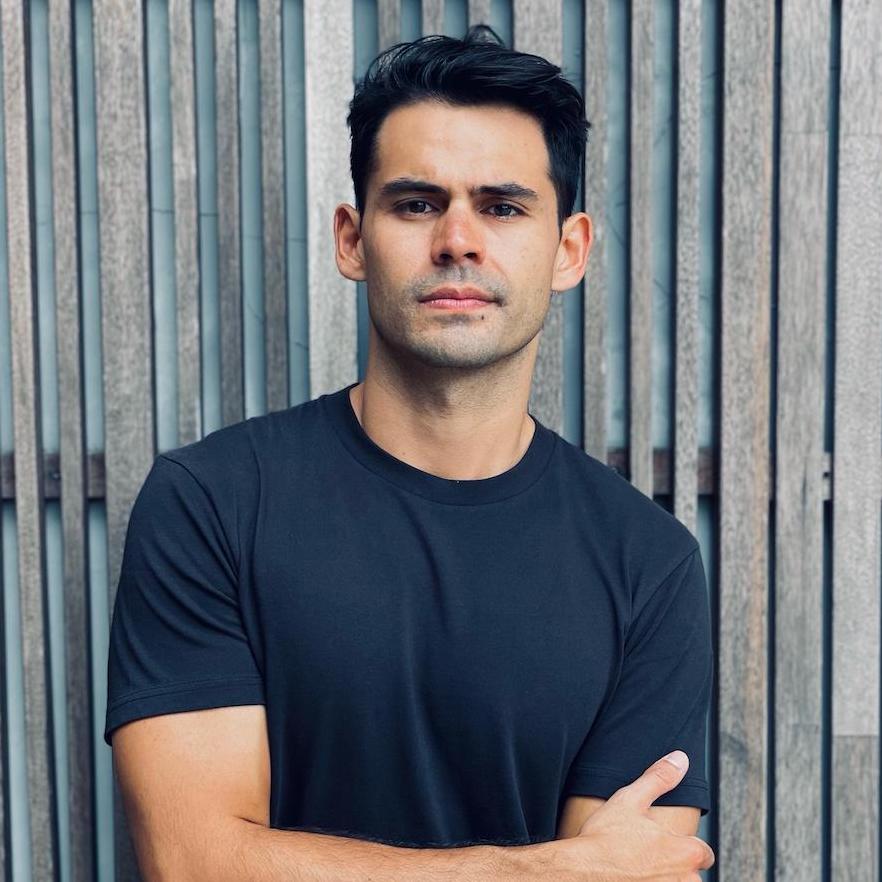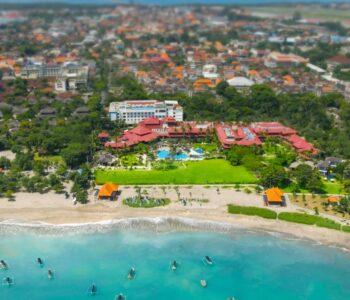Eco Tourism Bali is a social organisation on a mission to make Bali a sustainable destination by 2030. Watch or listen to our interview with founders Suzy Hutomo and Rahmi Fajar Harini, available on the NOW! Bali Podcast. In a discussion with Editor Edward Speirs on Bali’s environmental issues, they share their vision for the island’s sustainable future and what it will take to get there. The episode is best watched as a video, both available on Spotify (below) or on YouTube available here.
Available On:
iTunes • Spotify • Google Podcasts • Pocket Casts • Radio Public
Eco Tourism Bali: Future-Proofing the Island

Bali, renowned for its breathtaking landscapes and vibrant culture, has faced escalating environmental challenges as its tourism industry continues to grow. Issues such as waste mismanagement and ecological degradation have prompted a local response led by Eco Tourism Bali.
Founded in 2021 by Suzy Hutomo, Chairperson of BodyShop Indonesia, and Rahmi Fajar Harini, a Balinese entrepreneur with a background in hospitality and public relations, the social impact business is building the path to make Bali a sustainable destination by 2030.
“Prior to Covid, tourist arrival numbers grew like a hockey stick, and I was really getting worried because I saw the sheer appetite for mass tourism,” says Suzy Hutomo, a longtime activist and environmentalist.
“We all understand that mass tourism has serious consequences for land-use and the environment, especially the loss of green areas. So how can we be resilient? How can we retain the beauty of the island, and still have economic benefits? How do we protect what we love?”

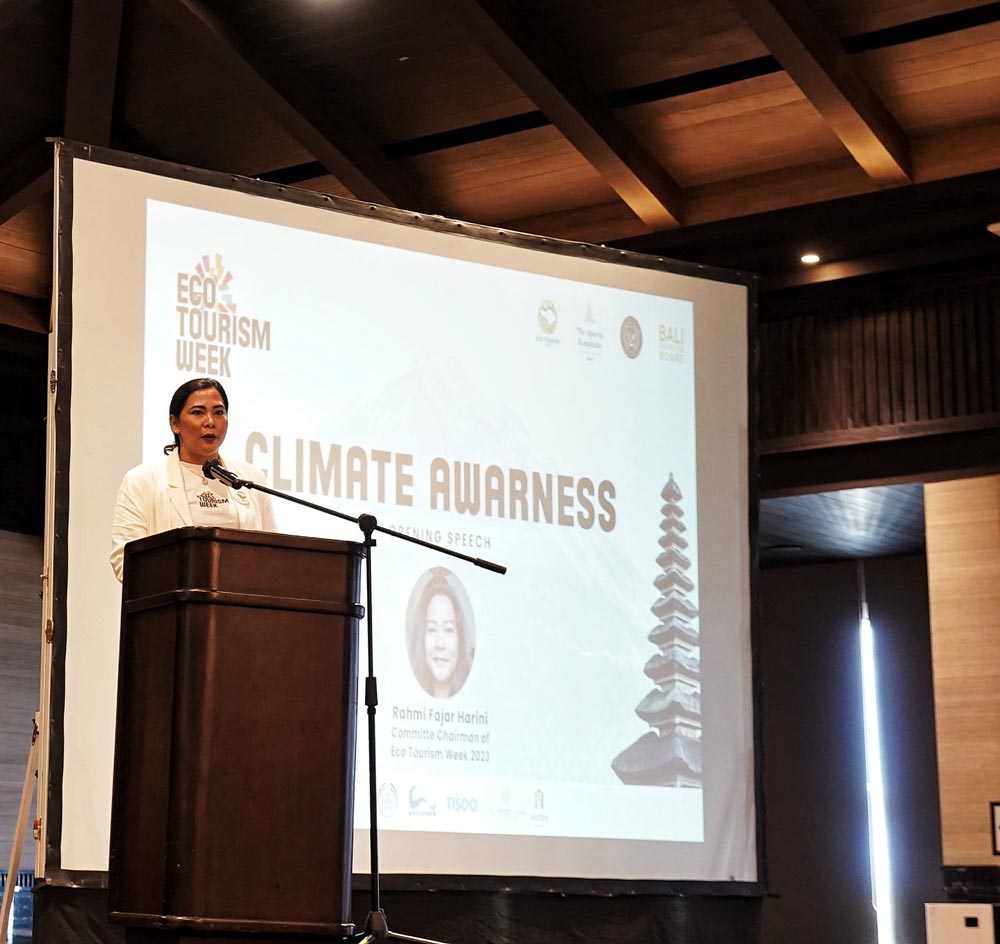
Now, this isn’t just a feel-good community movement, Bali’s own economy is inextricably linked to the visitor experience and the state of the island’s environment has a direct impact on that. The island generates a substantial amount of waste, posing a threat to its beaches and ecosystems. Water scarcity is exacerbated by a deficit of 3000 tons of water, with hotels extracting water from the ground. The lack of awareness and literacy surrounding sustainability compounds these issues, affecting businesses and the local community alike. Ultimately, these all put Bali’s future tourism industry at considerable risk.
That’s why Eco Tourism Bali (ETB) focuses primarily on the hospitality industry, understanding that these are the businesses most dependent on the island’s positive global reputation, plus they are very much ‘on the frontline’ of change. There are roughly 2,813 affordable accommodations, over 200 four- and five-star hotels and more than 3,868 restaurants. Collectively they can make a lot of positive change.
ETB’s first programme has been the creation of a ‘Sustainable Guideline and Verification System’, one for hotels and one for restaurants. This was done in partnership with Kopernik, a Bali-based R&D lab for social and environmental challenges. They created a 30-point criteria based on international sustainability standards, like the GSTC, covering a broad range of components covering ‘Resource Conservation’ (e.g. installing water and energy saving equipment), ‘Pollution Reduction’ (e.g. proper waste management), ‘Conservation’ (e.g. native species landscaping, wildlife interaction policy) and ‘Social Benefits’ (e.g. local purchasing and cultural interaction).
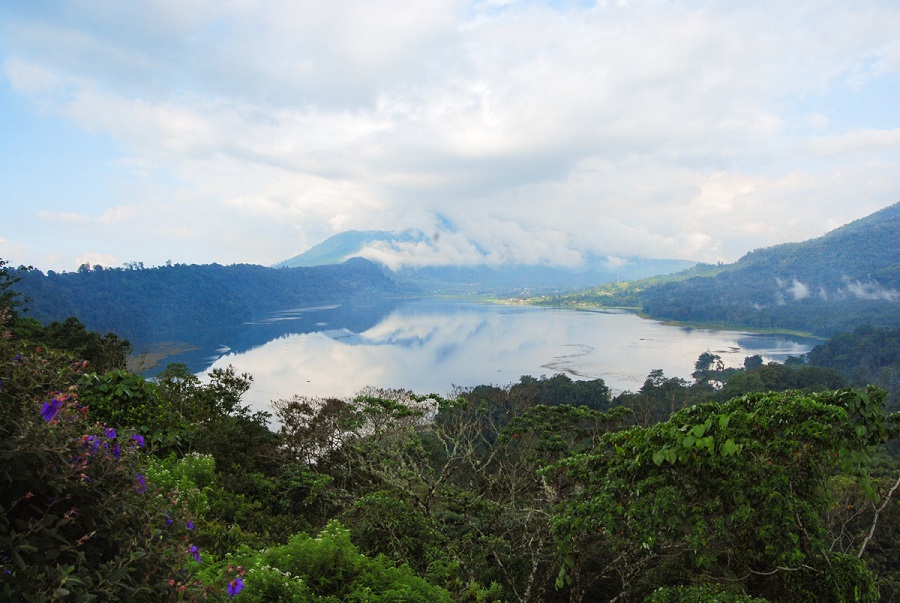
Starting out, Suzy and Rahmi came across quite a few hurdles. “What we found out was that the literacy surrounding sustainability and being climate-friendly is at a ‘headline level’, they do not know what it really entails,” shares Suzy.
“Exactly,” adds Rahmi. “A lot of businesses want to be sustainable, but many don’t know where to start. So, we’ve made it approachable for businesses of all scales.”
Reaching a broad range of hotels and restaurants has been an important factor for ETB, as positive changes require large-scale involvement. To be inclusive, they developed a self-assessment for smaller businesses to gauge where they are and have a blueprint on how to improve, whilst those looking to take it to the next level can get verified by the ETB team and get officially listed as one of Bali’s sustainable businesses. ETB aims to verify 550 businesses by 2030, but their ultimate goal is for 2050 with 7,150 verified Bali businesses to achieve climate neutrality in tourism and hospitality.
ETB is simultaneously bridging local organisations, solutions providers and businesses, creating a community forum to breed collaboration between all the different stakeholders. The establishment of the “Tribes of Eco Tourism Bali” serves as an ongoing collaborative forum, plus it establishes a sustainable supply chain to connect demanders and suppliers of eco-friendly and sustainable products.
Eventually, these will all be listed on their ‘Sustainable Tourism Online Platform’, set to be launched in 2025 as a resource and guide for residents, visitors and businesses.
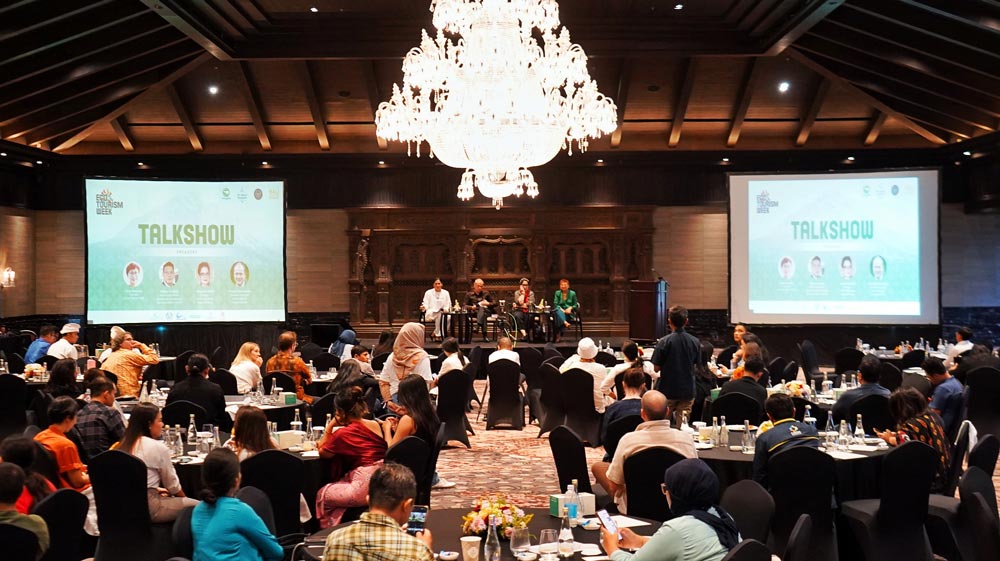
The community gathers regularly, with ETB holding workshops, education campaigns and events, culminating in their annual Eco Tourism Week. The event features talk shows, discussions, presentations and a trade show. Their last event was held in December 2023 at The Apurva Kempinski Bali, featuring 200 invitees from government, hospitality, local community and startups. The annual event included awards and recognitions for their journey of sustainability.
Central to Eco Tourism Bali’s initiatives is their Regenerative Bali Program, designed to sequester carbon emissions through mangroves, coral, and local tree planting. Addressing climate change is a particularly important goal for Suzy Hutomo, who has been a climate presenter with Al Gore’s The Climate Reality Project since 2011. Thus, ensuring that Bali is also climate resilient for the future is high on the list.
The chosen initiatives address several factors. They help to restore and conserve already damaged ecosystems, add economic value to the coastal communities that depend on the ecosystems and they also act as effective carbon sinks, which will help Bali achieve climate neutrality.
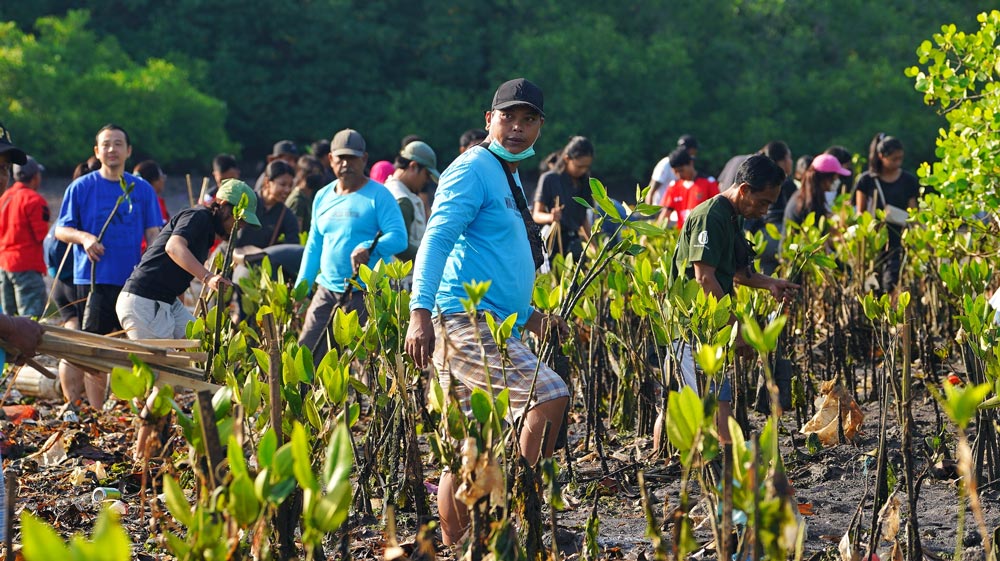
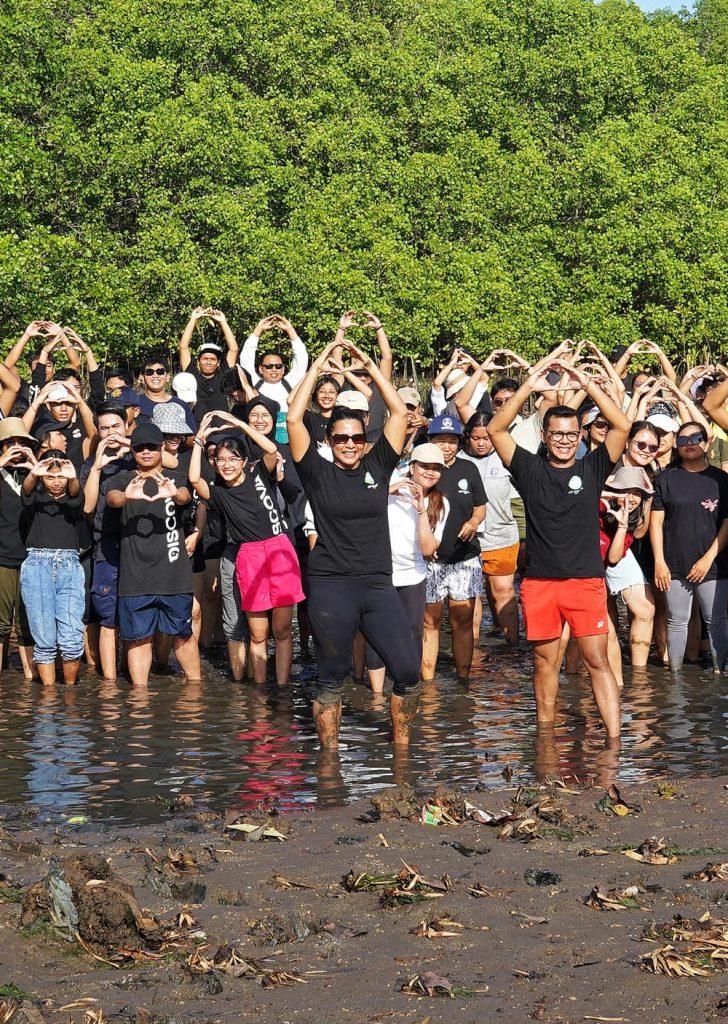
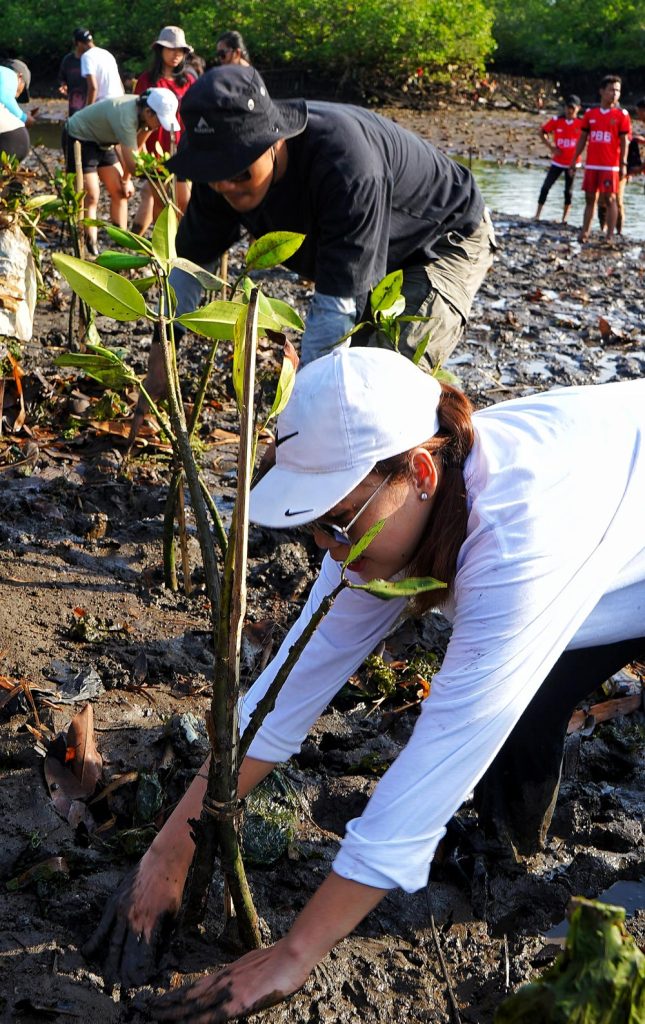
Currently, ETB is working with the community in Kedongonan Village for mangrove planting. Currently, 50% of the ecosystem here has been damaged, and ETB’s target is to plant 10,000 mangrove seedlings across 1-hectare. This helps to protect from coastal, encourages local marine bio-diversity and will eventually sequester 23.76 tons of CO2 every year. On 17 December, during Eco Tourism Week, 1,000 mangroves were planted in the area by volunteers and the local community.
As for their coral planting programme, this is done in Padang Bai, East Bali, where up to 60% of the coral reefs are believed to be damaged. Their goal is to plant 150 coral reef stars (2,700 coral seedlings) in a 150sqm area. This will contribute to 2.7 tons of carbon sequestration and of course, improve the marine biodiversity and thus attraction of the area, already popular for diving and snorkelling.
Suzy emphasises the need for collective action, stating, “All stakeholders have to work together for this to work. Nobody can do it alone.” This sentiment underscores the collaborative approach Eco Tourism Bali advocates for in their sustainability initiatives.
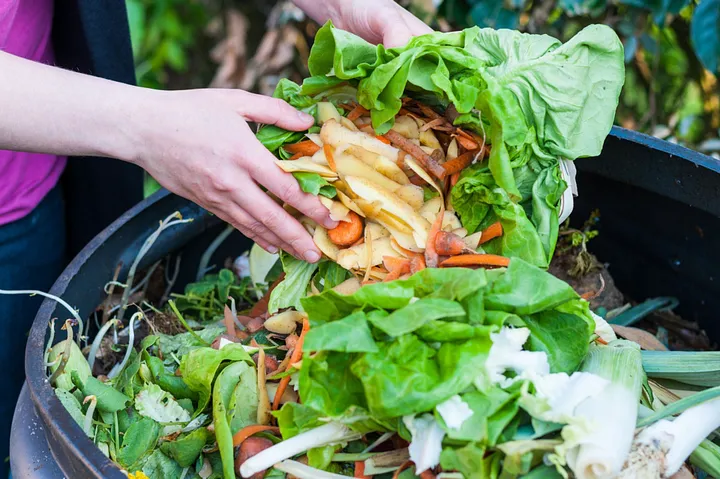
The organisation’s mission is important in the face of future tourism growth. Europe’s tourist numbers have already surpassed what they were pre-Covid, and by 2030 it is predicted that 50% of the world population will be travelling for leisure, with that in mind, it’s important Bali gets a head start on managing its resources in light of this. “We are an island, everything must be managed here. If we are overcapacity, especially with waste, then it must be dealt with effectively here,” adds Rahmi.
However, Suzy hopes to see a change in the style of tourism that Bali currently employs, especially if it aims to be sustainable. “It needs to be a more premium destination. We need to move from intensive, high-traffic conditions, low infrastructure, low sustainability and low climate adaptation. Bali will continue to be a major destination if we get it right.”
Eco Tourism Bali’s journey epitomises the transformative power of sustainable initiatives. By tackling Bali’s environmental challenges head-on, the organisation is not only protecting the island’s natural beauty but also fostering a sustainable future for those living on the island.
To find out more about Eco Tourism Bali, follow them online at @ecotourismbali or go to ecotourismbali.com

